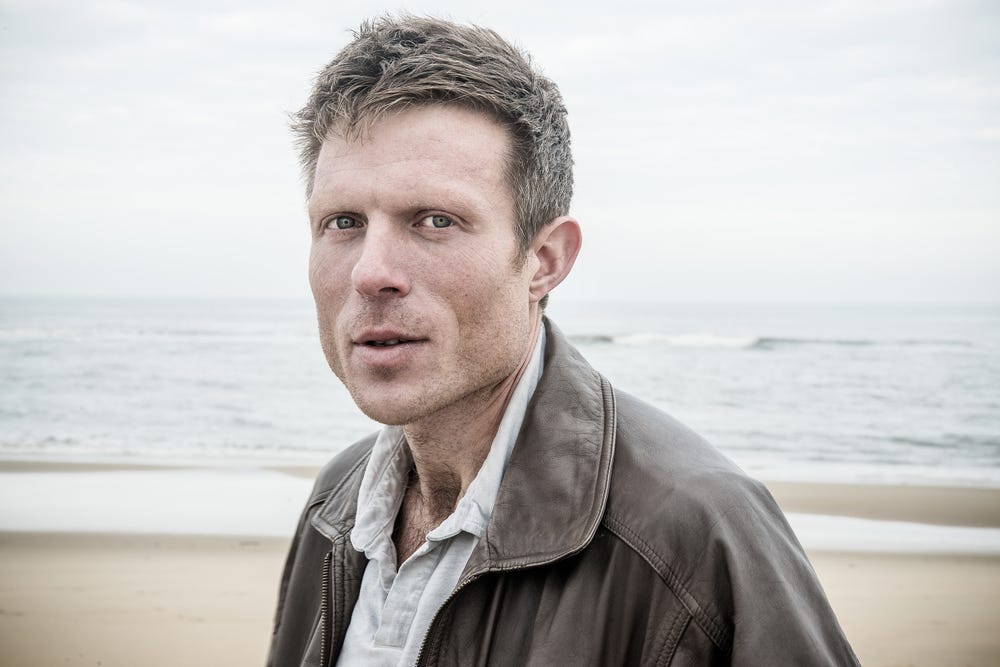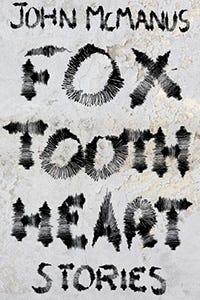interviews
Propulsive Energy: A Conversation With John McManus, Author Of Fox Tooth Heart

by Jonathan Lee


The first story in Fox Tooth Heart, John McManus’s fourth book of fiction, starts with a power chord: “The story of the creation of my elephant vampire songs begins on the December morning when I killed Aisling, heroine of our last album and my fiancée, in one Porsche and fled Texas in another.” It put me in mind of the opening line of Flann O’Brien’s The Third Policeman: “Not everybody knows how I killed old Phillip Mathers, smashing his jaw in with my spade …” Like O’Brien, or Barry Hannah, McManus has a gift for idiosyncratic openings that make the reader lean in and listen. His sentences carry a confidential note. They make you excited and a little afraid for whatever is coming around the corner. Read “Elephant Sanctuary” at Electric Literature’s Recommended Reading and you’ll soon see what I mean.
McManus is the winner of a Whiting Writers’ Award, a Fulbright Scholar grant, and numerous other accolades. He is a major American author with a wonderful eye for people’s insecurities and a wonderful ear for the babble of their dreams. Fox Tooth Heart, published by Sarabande Books this month–the same press that’s been on a recent roll with Arna Bontemps Hemenway’s superb Elegy on Kinderklavier and Kerry Howley’s Thrown–contains several stories that will rattle around in your brain for a long time after re-reading.
In the interview that follows McManus told me about what he’s looking for in his sentences, the story behind the best rejection letter he’s ever received, and the writerly advice he’d like to scream into the ear of his younger self: “Slow down…Be patient. Take care. Drink less.”
Jonathan Lee: It’s clear you take a lot of care over the way your sentences sound–the pounce and rhythm of them. What goes into a great sentence, and what are you looking to inject and withdraw as you revise?
John McManus: Nothing makes me quit reading faster than strings of insignificant actions like “He looked at her.” That’s my bugbear lately: “She looked across at him. He met her eyes.” This kind of thing is pervasive, so I wish I could ignore it, but the truth is any line whose sole purpose is to tell me one character is looking at another character while those two characters are talking will kill my desire to read on. So I try to make sure every sentence is doing two or three things at once. If a sentence doesn’t have any propulsive energy, I cross it out.
Lines like “He looked at her” cede fiction’s best natural advantage and capitulate to television.
I’m reminded of something Ben Lerner said a few years ago in an interview with Teddy Wayne: he’s “bored to tears by most of the mainstream supposedly realistic novels that run bland 21st-century sentences through 19th-century structures in order to produce what’s essentially very inefficient television.” TV and film are the dominant narrative art forms, at least in the United States. HBO dramas have countless huge advantages over fiction, like multimillion-dollar budgets and production teams and state-of-the-art cinematography, but one thing they’ll never do better than prose is burrow into characters’ minds to name and describe their desires and fears. Lines like “He looked at her” cede fiction’s best natural advantage and capitulate to television. But this is turning into more of a polemical rant than an answer to your question.
JL: You’ve written a very well-received novel, Bitter Milk, but in the last 15 years you’ve kept coming back to short stories. What’s special about the short story form, and why does it seem to be the natural container for the ideas you’re interested in exploring?
JM: I feel like I know what I’m doing when I’m writing stories. The backbone of a story can be a single vector of progressive action, so there’s an elegant simplicity to the form that I enjoy. I can hold a whole story in my head at once, which I can’t do with a novel. I can finish a story in a month or two; a novel seems to take me ten years.
JL: Back in 2005, you were interviewed by Dan Wickett for the Emerging Writers Network blog. You said in an aside that the best rejection letter you’d ever received was from The Atlantic, two sentences long: “The stories you sent us are quite good, and we like them a lot. However, your vision is dark, and we resist it.” Do you believe your own vision as a writer is dark, and has it changed in the last ten years or so?
JM: That letter was responding to a story in Stop Breakin Down, my first collection. I wrote those stories in college when I didn’t know what I was doing. I followed my instincts, and sometimes it worked out okay, but I either didn’t know how to revise or didn’t have the courage for it. As soon as I finished a story, I would cringe to imagine looking back at it, because I perceived so many problems that I didn’t know how to fix. Possibly those included the kind of gratuitous misery I hate encountering in narrative art, where characters suffer not because the story needs them to but because the author has decided they should suffer.
I wouldn’t have described the collection as “dark” prior to reading the reviews, which–in praise or otherwise–called it bleak, despairing, hopeless. People would ask how I could bear to put my characters through such pain. To answer “They’re not real people” probably sounded glib, but I meant the characters’ pain didn’t affect me while I was writing because characters were artificial entities that had more in common with mathematical variables than human beings. To write made me feel tranquil, no matter what was happening to my characters. That was one of the main reasons why I wrote. When I’m reading, it’s different, of course. I often teach The Easter Parade which means I’ve read it over and over, most recently in July. Every time, I’m moved to tears. Emily Grimes’s life is miserable, and I wouldn’t want to spend ten minutes in her head. But her pain tells the truth, so I enjoy it, aesthetically at least.
JL: Fox Tooth Heart begins with the creation of a character’s elephant vampire songs, and ends with the vivid image of those lithium-and-lye bottles and the feeling of “high tide” in one’s veins. How did you find the right shape for the collection, and the right ordering of the stories within that shape?
JM: I wanted to open with “Blood Brothers.” It was my favorite story in the collection, and I felt like it has a quick hook — but it’s also a bit depraved. Sarah Gorham, the editor-in-chief at Sarabande, convinced me to put “Elephant Sanctuary” first instead. That required reordering everything else, which felt like trying to solve a Rubik’s cube. A lot of stories got shuffled around until the last minute.
JL: Tell me about the humor in your work. In one story your narrator says a particular guy’s face was “shaped that way from having no shame. Without shame, you could grin and crack jokes.” To be a good writer–and a funny one–do you need to be shameless?
JM: That’s tricky since shameless can mean different things. The passage you quote expresses the thoughts of a character in “The Gnat Line” who’s too full of self-loathing to let anyone befriend or tease him. He brings a kind of bitter irony to most of his observations, and he might think of himself as funny, but he’s too ashamed of himself to be honest. The guy he’s talking about, who definitely thinks of himself as funny, is shameless in both senses of the word, but his jokes are limited to wisecracking and his honesty is impaired by an almost total lack of introspection.
What we hate, or what confuses us, tends to obsess us, which is absurd.
I doubt I could give an objective explanation for how humor works in my stories or for that matter in anyone’s. If I try to describe what I think of as some of the funniest passages in literature, they don’t sound funny out of context — like when the protagonist of Flann O’Brien’s The Poor Mouth gets beaten up for speaking Irish instead of English, or the women in Flannery O’Connor’s story “The Displaced Person” gleefully mock the Guizacs, or the writer in Thomas Bernhard’s Woodcutters sits around for 200 pages despising pretty much everyone in Austria. I tend to find obsession funny, or at least absurd. What we hate, or what confuses us, tends to obsess us, which is absurd. In “The Gnat Line” Stephen envies Bruce’s ability to laugh, which contributes to his hating Bruce.
JL: Is a deep sense of place important to you as a writer and a person? Within Fox Tooth Heart you’ve managed to conjure, with wonderful energy, such a range of American atmospheres, from Arkansas ranches to the Florida coastline to the wilds of the national parks. The survival of the characters depends literally on the places around them, the air they breathe, the vagaries of the weather, but their imaginations seems to thrive on a sense of place too–Hunter thinks at one point that his “survival…depended on faith that the land was make-believe.”
JM: I’m not sure a deep sense of place is always important to me in an abstract sense. I mentioned Bernhard — some of his novels are confined to rooms where bitter men sit around ruminating, but that’s appropriate given what the men wish–if you can call it wishing. Hunter in “Cult Heroes” is one of several protagonists in Fox Tooth Heart who yearn for physical danger and open space and wilderness. The line you quote refers to his mother’s Christian Science beliefs, which Hunter feels ambivalent about. In the course of the story he goes from ruefulness to mockery to consideration that she could be right in thinking the world is a beautiful, uncanny illusion built to test his faith. The main action — he sneaks into Grand Canyon National Park with a mountain bike, planning to ride illegally from rim to river on a trail where the slightest wrong move could kill him — is in part a flirtation with his mother’s belief system.
It took me ten or twelve drafts to figure that out. Until I realized what was going on between Hunter and his mother, the setting struck me as arbitrary — like I was writing about a trail in the Grand Canyon just because I felt like it, rather than because the Grand Canyon was the essential place where Hunter’s story needed to play out. So I guess I’d say that if people read a story of mine and don’t come away thinking that the place is essential to the plot or that the characters seem affected by the place, I’ll feel like I’ve failed.
JL: In the stories that comprise this collection you use section breaks often, leaning into the white space those offer. By contrast I think I’m right in saying that Bitter Milk is a single flow–the voice in that novel resists neat skips in time and place, the arrangement of experience into units. What kinds of things are you thinking about when you determine whether to use this or that structural device in a particular work?
JM: Bitter Milk is about a fat nine-year-old boy who feels trapped in a manner that I hoped an endless unbroken chapter would help convey. Plus there weren’t any major breaks in time; the story played out chronologically over a period of a few weeks. It’s easy now to look back and wonder if chapter or section breaks might have helped me sell a few more copies. Still, even in Fox Tooth Heart I’ve tried to use section breaks as seldom as possible, maybe because they feel like the easy way out — like cheating somehow.
JL: Maybe we could talk in detail about how a specific story in the collection came together. I was particularly intrigued by “The Gnat Line” — where the seed of the idea might have come from, how you sought to control the material, why it felt right to cleave to that close third person perspective.
JM: The plot of “The Gnat Line” conflates two news stories I read within a few weeks of each other in 2009. In one, the police were breaking up a camp of registered sex offenders who’d been camping in a park, same as in “The Gnat Line.” The other told of a man arrested for being naked inside his own home. I don’t know how that case turned out, but he was being threatened with the sex offender registry. So I created a character who’d lived through a similar circumstance, and plopped him down in a camp like the one I had read about in the paper.
I can’t remember how I settled on the modular format, but I know I wanted the severity of the characters’ crimes to vary across a spectrum. The real-life camp existed because a law in Georgia–since scaled back–prohibited sex offenders from living within a thousand feet of a school, church, park, bus stop, swimming pool, or several dozen other categories of places children might gather. Some states’ offender registries can list dangerous psychopaths alongside people arrested for crimes as minor as peeing in public, so I decided my fictional camp would house rapists like Allen and also a sympathetic figure or two like Jeremy. Seven men live in the camp, and “The Gnat Line” has seven chapters, but there are only four points of view. Travis, Bruce, and Gus didn’t turn out to be figures in search of redemption or change. I began and ended with Stephen because he struck me as the most complex of the bunch. He’s aggrieved and supercilious, and thinks of himself as unfairly wronged, but secretly he knows he’s guilty of hurting people more severely than the court has learned about.
JL: This collection is full of memorable characters. How do you balance the need for them all to have, to some extent, their own little sheen of uniqueness, with the desire not to distort into caricatures?
JM: Most of these stories are told from the subjective points of view of characters whose belief systems are pretty idiosyncratic. They themselves can have prejudices or fixations that distort the people they encounter into caricatures, like when Victor in “Gainliness” is living his booze-soaked dream-life in the years after grad school. The only qualities he notices in other people are the ones that pique his romantic imagination, or turn him on. So that’s kind of a tightrope to try to walk. I don’t know. You could say the stories are stylized in certain ways, but I’ve tried to make everyone seem real.
JL: What would you tell your younger self if you could go back to Goucher and whisper some writerly advice in his ear …?
So for starters I would whisper, Slow down. Or I would scream it, not whisper.
JM: In the early stories I had this desperation to say everything all at once, and then as soon as I’d finished, I hurried on to the next piece out of fear of looking back closely at what I’d done. For a while I was writing a story a week. So for starters I would whisper, Slow down. Or I would scream it, not whisper. Be patient. Take care. Drink less.
JL: The oldest and most awful of questions for a writer: what’s next?
JM: I’m finishing a novel about a girl who tries to save a neighbor boy from the religious madman who’s raising him, and it takes place in a remote Smoky Mountain valley not far from where I grew up. I’ve told my agent I’ll send it to her by the end of the year, which I hope doesn’t turn out to be a lie. I’ve been working on it for longer than I care to admit. If I ever finish it, I’ll get back to my other novel-in-progress, about a fabulist reporter sent to Uganda to cover the so-called “Kill the Gays” Bill. Since he’s not capable of performing the serious journalism that that requires, he fictionalizes a story that gains traction in part because Americans are so eager to believe bad news out of Africa. And if I ever finish that one, I’ll get back to writing stories, which is more fun.









